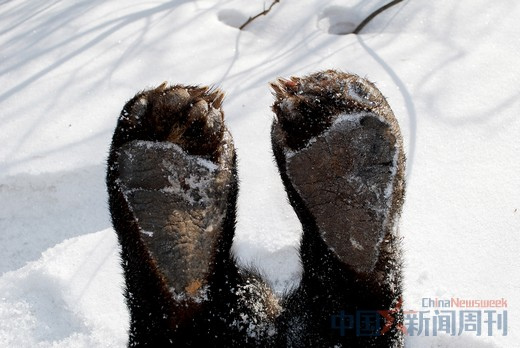
(Ecns.cn) -- Poaching wildlife has gone on in China for decades, but recently the soaring black market value of bear organs has caused a spike in illegal hunting of the protected species, China Newsweek reports.
On July 2, police in northeast China's Jilin Province arrested six men on suspicion of poaching five state-protected black bears on the northern slope of Changbai Mountain Nature Reserve. The gallbladders and paws of the bears had all been removed.
Bears in danger
Early last month, Hu Donglin received a mysterious phone call alerting him to the slaughtered bears at Changbai.
As a wildlife activist and writer, Hu understood how serous the matter was: there had never been more than two bear deaths at a time at the mountain.
On June 12, Hu hired a guide and ventured up the mountain. His destination was a 300-year-old primeval forest that formed from a volcanic eruption.
After two hours of walking, Hu smelled the odor of rotting bodies and soon found the five dead bears. All had their hearts, gallbladders, heads, paws and other parts removed.
Hu was heartbroken. As a descendant of the Hezhe ethnic group, which has a great reverence for the bear, Hu has regarded the creatures as his "relatives" since childhood.
Hu says about ten bears had been found dead at Changbai Mountain during the past year. By his estimates, there might only be about 30 black bears and two to three brown bears left there.
Poaching war
Zhang Congfeng, 49, is head of the inspectorate at Changbai Mountain Nature Reserve. He's been protecting wildlife there since he was 18. Zhang loves his job, but says the work has many challenges.
According to China Newsweek, there are currently nine conservation stations in an area covering about 200,000 hectares, and the total number of staff is fewer than 200.
It's a very large forest, and the limited manpower hardly covers the whole area, says Zhang. A patrol team needs at least two days to walk one-ninth of the area, he adds.
Moreover, the inspectorate does not have law enforcement power, so its staff members are often limited when trying to prevent illegal poaching, Zhang points outs.
Zhang recalls an experience during a patrol mission when he discovered two suspicious poachers who opened fire on him.
Since 2006, the patrol team no longer carries submachine guns, but must instead rely on rubber sticks.
Even if the teams succeed in seizing poachers, the stations must set them free if there is no evidence of a violation, says Zhang.
All the inspectorate can do is to stop poachers from playing tricks and prevent bears from visible danger, a difficult situation to handle, he adds.
Future of the forest
An insider told China Newsweek that the price of bear paw has increased from 680 yuan (US$107) a kilogram in 2008 to over 1,200 yuan (US$188) this year on the black market.
In the recent bear killing case, local police said the protected wild bears were not killed by poison, but by home-made bombs, a new approach to hunting the animals.
With Hu Donglin's assistance, the police finally seized the suspects, confiscating a homemade shotgun, 20 bullets and two homemade explosive devices.
Hu hopes the arrest will bring peace to the forest for awhile, but is uncertain about the future.
Bear parts, most notably gallbladders and paws, are considered treasures in traditional Chinese medicine, yet hunting wild bears may result in the extinction of a rare species, experts warn.
Demand for black bear parts—compounded by habitat loss—has already earned the species a "vulnerable" listing by the International Union for Conservation of Nature.

Copyright ©1999-2011 Chinanews.com. All rights reserved.
Reproduction in whole or in part without permission is prohibited.